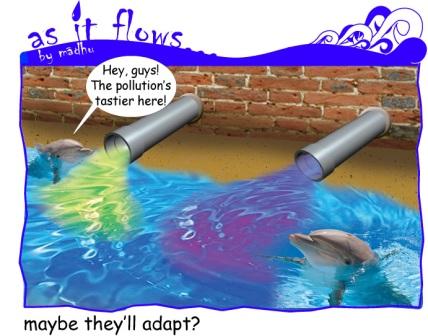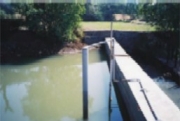/topics/ecology-and-environment
Ecology and Environment
Relevance of Meltwater in River Basin Hydrology
Posted on 23 Jul, 2010 10:53 PMA peer paper in Science Magazine focuses on the core of a riverine system, the upstream basin, and its impact on the entire river basin.
Workshop on "Natural Resources and Governance" , Bangalore
Posted on 23 Jul, 2010 05:17 PMVenue: Gandhi Bhawan, Kumar Park East (Near Shivanand Circle), Bangalore- 560001
Description:
The workshop will deal with both the issues of the accelerated use (rather abuse) of Natural Resources: Jal, Jungle, Jameen, Khaneej and beej (water, forest, land, minerals and seeds), on one hand and the deteriorating governance which are leading to further aggravation leading to very adverse impact on the livelihood and health of the rural poor including the tribals and environment.
Proposing a National River Authority of India (NRAI)
Posted on 23 Jul, 2010 04:29 PMIntervening at the urgency of the water situation of the country and need in larger interest of the people and nation from political, legal, social, administrative, commerce,trade,cultural, world tourism angles, apart from agricultural and drinking water angle; annual devastation by floods,and loss by drought. One single Authority, with P.M. as Chairman may hopefully bring expected and good results in river management; riverine rejuvenation - National River Authority of India
Here is a draft proposal for such an authority to be created.
We are looking for collaborations on making this a reality.
Please post your comments.
Study of the Investment Ecosystem in Cleantech!
Posted on 23 Jul, 2010 03:54 PMYou need to raise money, understand the investment ecosystem!
No matter how wonderful an idea solves a problem it needs capital!
Clean technology is and will always be capital intensive because, it is in the infant stage requiring R&D and serves a huge chunk of the population.
Project Boond - V, a comprehensive mitigation initiative in the drought prone regions of Bharatpur
Posted on 21 Jul, 2010 01:47 PMWith the failure of monsoons in Rajasthan and dry-up of the Bilaspur dam, the water situation assumes graver proportions in most parts of Rajasthan, besides Jaipur, Tonk and adjacent districts. These areas, now in the news for acute water shortage problems, have always depended upon monsoons for their traditional rainwater-harvesting systems and the riverine sources.
While the Government has taken remedial measures with construction of tube-wells across the rural and drought-prone areas, they have been sporadic and insufficient at their best. Merely announcing relief measures and planning of schemes on paper as an immediate disaster management strategy are not solutions to mitigation of water problems in this State.
Prof G.D. Agrawal resumes fast unto death to save the Ganga, Swami Avimukteshwaranand and others to join in support
Posted on 21 Jul, 2010 11:10 AMForwarded to the Portal by: Ayan Biswas
Image and News Courtesy:
Shankracharya designate Swami Avimukteshwaranand ji presided over an emergency meeting organized by Manushi Sangathan, Ganga Ahvaan and Ganga Yamuna Jal Biradri to express our strong protest against the patently illegal decision of the Group of Ministers giving clearance to the Loharinag-Pala dam on the Ganga River. The following expert members of the NGRBA also participated in the meeting to express their strong protest having been kept in the dark about the appointment of the GoM which has passed a virtual death sentence on the most sacred river of India: Rashid Hyatt Siddiqui, Rajendra Singh, Rama Raota and Ravi Chopra.
Applicability of remote sensing techniques to monitor changes in land use and water spread area in Koppal district of Karnataka – A research report by National Institute of Hydrology
Posted on 21 Jul, 2010 10:11 AMThe report deals with the applicability of remote sensing techniques to monitor changes in land-use and water spread area for the Yelbarga and Kustagi talukas of Koppal district in Karnataka. Information on the rate and kind of changes in land and water resources is essential for planning, management and regularizing the use of such resources.
Environment flows - Continuing the discussion
Posted on 21 Jul, 2010 12:41 AM
Augmenting groundwater resources by artificial recharge: A case study - Kolwan valley - A report by ACWADAM
Posted on 19 Jul, 2010 04:45 PM This report by ACWADAM describes the results of a research study conducted under the DFID funded AGRAR project at the Kolwan site in Pune district of Maharashtra state in India. The research focused on studying the usefulness of artificial recharge to augment groundwater resources through watershed development.
This report by ACWADAM describes the results of a research study conducted under the DFID funded AGRAR project at the Kolwan site in Pune district of Maharashtra state in India. The research focused on studying the usefulness of artificial recharge to augment groundwater resources through watershed development.
An important criterion of the study was also to understand the impact of artificial recharge on already changing livelihoods in areas where watershed development was conducted on a large scale.
Transportation behavior of lindane in different types of soil – A research report by National Institute of Hydrology
Posted on 17 Jul, 2010 09:37 AMThe report deals with the transportation behavior of lindane, a pesticide used commonly in the agricultural and public health sectors in India, through sandy and loamy soils. The contamination of groundwater by pesticides is a worldwide problem because of their tissue degradation and carcinogenic nature. They are bio-accumulative and relatively stable and therefore, require close monitoring.
The pesticides used for agricultural, forestry and domestic activities leach into the groundwater and therefore, it is very important to study their transportation behavior in different types of soil media.





